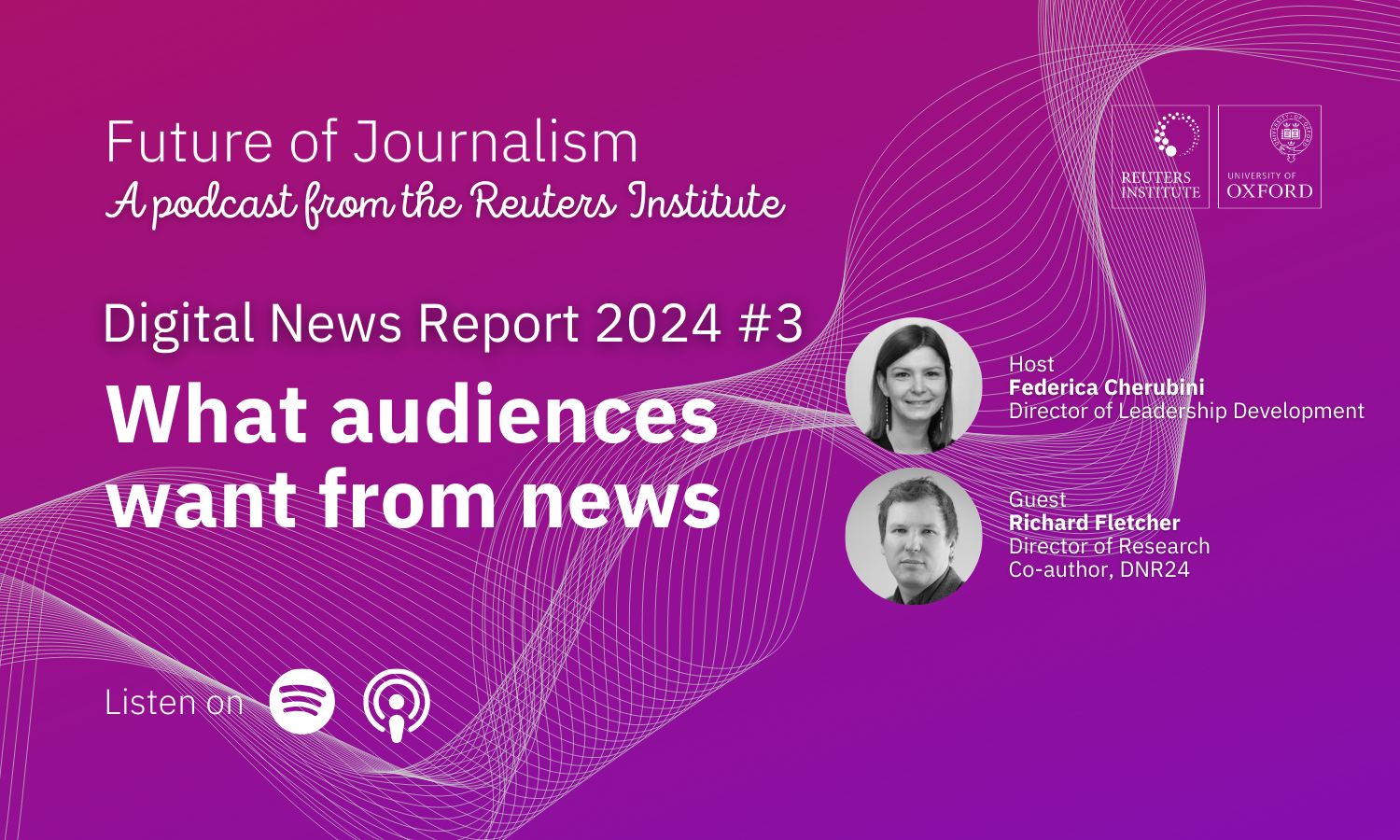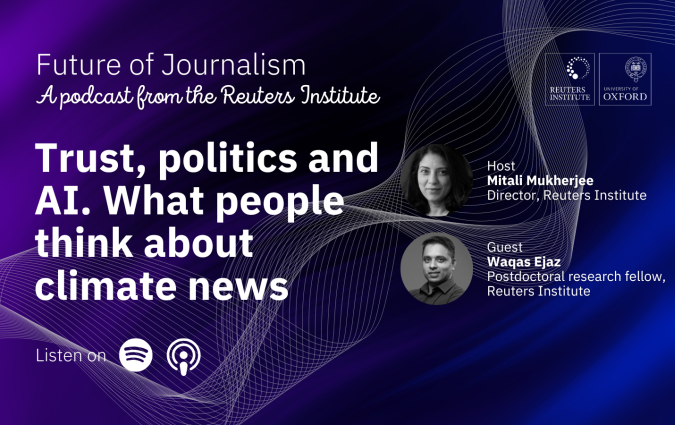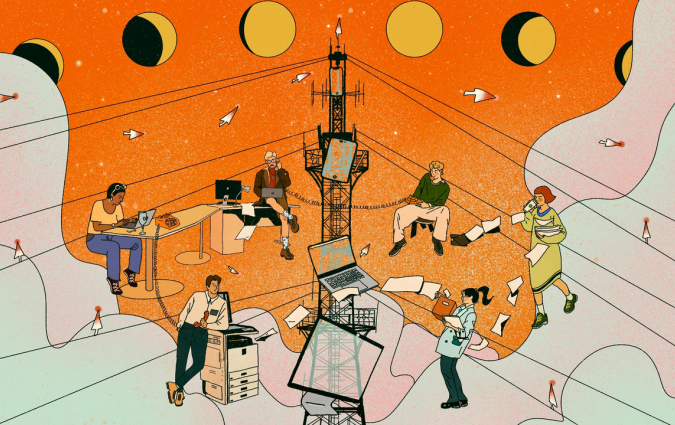Our podcast: Digital News Report 2024. Episode 3. What people want from news

In this episode of our Digital News Report 2024 podcast series, we look at what people say they want from news. Do audiences want more than to just be informed and updated? Are they looking to be entertained or inspired? We speak to an author of the DNR who has explored this issue in a special chapter, and ask what the news media could be doing to address any perceived gaps in how they are delivering the news.
Speakers:
Richard Fletcher is Director of Research at the Reuters Institute. He is primarily interested in global trends in digital news consumption, comparative media research, the use of social media by journalists and news organisations, and more broadly, the relationship between technology and journalism. He is the author of a Digital News Report chapter on what news audiences want from news.
Our host Federica Cherubini is Director of Leadership Development at the Reuters Institute. She is an expert in newsroom operations and organisational change, with more than ten years of experience spanning major publishers, research institutes and editorial networks around the world.
What needs does news serve? | The most important user needs | How well the news media meets these needs | The impact of press freedom on user needs | Lessons for news media on user needs
What needs does news serve? ↑
Federica: So when we think of what news exists for, we might immediately think it's to keep people informed about events that are happening around the world. But news actually serves a lot more purposes than that. Can you tell us what your chapter set out to look at and how you did it?
Richard: Yes, as you say, it may seem like a strange starting point. Because if you ask why do people consume the news, it may seem obvious, to learn about the things that are happening around them. But actually, there's a long history of research that has looked at this question a bit more deeply and found other reasons for why people might want to consume the news. So going back, as far as the 1940s, Bernard Berelson in the US, in New York, looked at how people felt about missing the newspaper when there was a strike and found that yes, people did miss learning about their city and about the world. But they also missed, for example, a sense of companionship that they got from reading the newspaper or a sense of being connected to others in society. And research in the 1970s, under the heading of ‘uses and gratifications theory also explored this question and found that people use media and news media specifically for a whole range of different reasons, such as entertainment, diversion etc. So there's a long history of this type of research. And more recently, newsrooms have looked at this, in particular, through models like the User Needs model, which was originally developed at the BBC, and later evolved by Dmitry Shishkin and others. And what this aims to do is, is classify and structure different news items or news articles based on the different needs that fulfils? So, the different things that people want from the news media, such as educate me, keep me up to date, inspire me and so on. And because this model has been adopted by many newsrooms across the world, we wanted to devote some time in the survey to asking about this. So more specifically, we asked people, how important each of the eight user needs in the model are to them. And then a follow up question which asks them how well they think the media performs in satisfying these needs.
The most important user needs ↑
Federica: And of these needs you identified, what did audiences in the survey consider the most important one?
Richard: Well, firstly, there are eight user needs in this particular model. And these are grouped together into what are called four basic needs. So knowledge, understanding, feeling, and doing. And across all 47 markets where we did the survey this year, we find that knowledge, the knowledge needs, so keep me up to date on what's happening, which is especially important to people and keep me engaged with the news was the most important alongside understanding? So, educate me on an issue, give me different perspectives on an issue for both of these. So for knowledge and understanding 65% said that these basic needs are important to them. People are less likely to say that news that makes them feel a certain way, so be inspired or entertained is important to them. And the same with news that helps them do things in their life. But even with these, around half, say that they’re important to them.
So I think it's clear from this that people do want a range of different things from the news media, which of course is the basic idea that underpins some of the earlier research that I was I was talking about earlier.
When we look at the differences by demographic groups, on our which we do find that they tend to want slightly different things from the news media. So for example, news that inspires people, or diverts people, entertains them can become relatively more important for news avoiders, for example. And in some cases for younger people as well. But in general, the sort of hierarchy that I described earlier, which has knowledge and understanding at the top as the most important, you know, remains. That doesn't change. And the same is broadly true when we look at the results across different countries in our surveys. So in almost all cases, it's these understanding and knowledge-based needs that are most important to people.
How well the news media meets these needs ↑
Federica: And that's what audiences say they want from the news. And how well do audiences think the news media is meeting these needs?
Richard: Well, overall, people think that the news media does best at serving knowledge-based needs. So in particular, update me (64%). Across the board, several countries say that the news media does a good job of this. And then people are slightly less likely to say that the news media does a good job in helping them understand what's happening, and less well still, when it comes to needs around doing and feeling. But I think part of this is perhaps that people don't necessarily expect the news media to provide these things. There are lots of other sources of entertainment online, for example, and they may or may not be looking for the news media to provide this.
Federica: Given what you just said, if we look at what uses one against the perceived performance of what news media do, does this give us an indication of where the news media could be doing a better job.
Richard: So because we measured what people think is important to them, and we also have a measure of how people think the news media perform in those same areas, we can essentially look at the gap between those two measures. And when we weight this gap by the overall importance of each need, we can see that it's understanding-based needs, specifically give me perspective, that emerges as the biggest priority, according to people for the news media. As I've already mentioned, lots of people think that understanding basic needs are important that people are less likely to think that the news media goes does a good job in this area. Knowledge-based needs, so keep me up to date, these are these are important as well. But as we've already seen, people generally think that the news media does a reasonably good job of this. So this comes out with a lower priority in our calculations. Again, there is some demographic variation. So if we look at news avoiders, they're slightly more likely to say sort of, needs like inspire me are important, and they don't tend to think the news media does a good job of this. So that that can be a big priority for that group. But again, overall, it's understanding-based needs that emerges as the biggest priority.
The impact of press freedom on user needs ↑
Federica: Another angle that do you consider in the report was around how audiences priorities correlate with the variation in their country's news ecosystem. So for example, in particular, the degree of press freedom in each country. What did you find in relation to this?
Richard: Yeah, so we, we found quite a lot strong correlation between what people think is the biggest priority, according to our calculations and, and sort of press freedom as measured by Reporters Without Borders. And what we found is that in countries with high levels of press freedom, understanding-based needs are the biggest priority. So they have the largest gap between importance and performance. But in countries with low levels of press freedom, the biggest priority seems to be knowledge-based needs. And I think this is in part because in countries with lower levels of press freedom, simply knowing what's happening around you, becomes harder. But in countries with higher levels of press freedom, and this need is satisfied, in part because the news media are free to tell people what's happening, then people want to understand why things have happened, and not just what has happened.
Lessons for news media around user needs ↑
Federica: There is a lot to unpack in this chapter. And you briefly mentioned before the priority index, but can you help us identify any overarching lessons that journalists, that the news media can learn from what you discovered about user needs?
Richard: I think with so many different user needs, and so many different countries and different demographic groups, it can all get quite complicated, quite quickly. But I think the two basic points from my point of view is that yes, people, indeed want a range of things from the news media, but in addition to that people, for the most part, in most parts of the world, it's these core needs related to knowledge and understanding that people most expect the news media to satisfy.
Listen the whole DNR24 series
In every email we send you'll find original reporting, evidence-based insights, online seminars and readings curated from 100s of sources - all in 5 minutes.
- Twice a week
- More than 20,000 people receive it
- Unsubscribe any time







